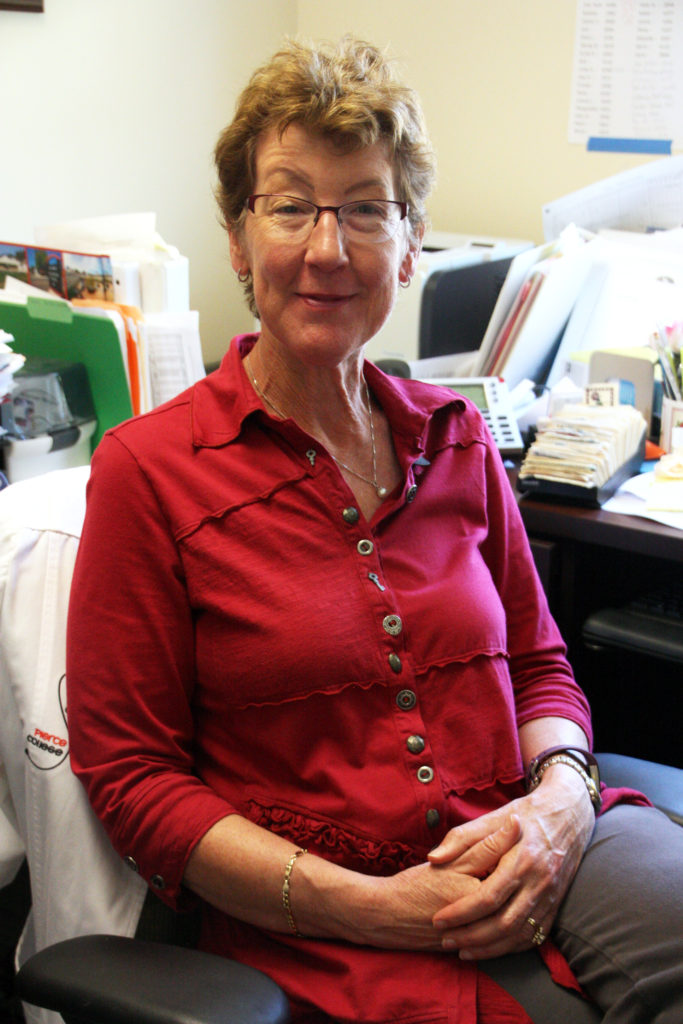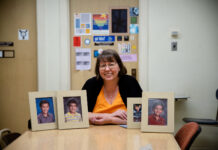
The maze of doors, desks and filing cabinets filled to the brim with paperwork that make up the Student Health Center, creates a cramped environment for the average person to wade through.
However, Director of the Student Health Center Beth Benne, who stands above the clutter, finds the space easy to navigate to her office. Once at her desk, she rests her back covered by her white lab coat with her title stitched in, on a polyester chair and takes a minute or two for a short break.
A workday at the center has its stresses, but as Benne scans the pile of binders and certificates that adorn her desk it reminds her of the reasons for becoming a nurse.
“I went into healthcare because I wanted to help people,” Benne said. “It gives me the opportunity to educate; I love teaching one on one. That is why I am here.”
Raised in San Diego, from a military family, Benne’s first hand experience with nursing came from a family friend she met in church, Mary Kelly.
Kelly, the first female commander of the nurses at Bethesda Hospital, became Benne’s childhood hero and inspired her to want to be a military nurse. However, Type 1 Diabetes diagnosis disqualified her from being eligible for any military position.
“It’s your job [as a military nurse] to take care of and protect American citizens,” Benne said. “You can’t have a problem that could potentially not allow you to do your job.”
A self-proclaimed “homebody,” Benne went on to local Point Loma College directly out of high school where she earned her nursing bachelor’s degree.
“It was the only four-year nursing program, aside from San Diego State, in the San Diego area, where I grew up. I wasn’t ready to go too far from home yet,” Benne said.
Recruited during the spring break of her senior year of college, Benne and a roommate booked nursing jobs in the oncology ward of Huntington Hospital.
“I was on the terminal cancer floor and I loved it,” Benne said. “It was one of the most amazing experiences of my life. But everybody died and I did burn out after about four years.”
Benne was later transferred to the Huntington Blood Bank, a facility nearby, during the height of the 1980 AIDS crisis.
“I remember this one patient. He had full blown AIDS, but I was so fond of him, he was just a hoot and a lovely, lovely man,” Benne said.
She regularly performed a medical procedure called Type and Cross Process. This procedure involves getting blood drawn the day before a transfusion to be typed and crossed, ensuring the blood type is as close a match as possible.
Benne performed the procedure on a male AIDS patient during her time at the blood bank. On her way back to the lab she tripped on an electrical cord and one of the tubes of blood broke leaving contaminates all over the floor.
Having lost the blood sample, Benne had to call the patient again to bring him in for another drawing of blood.
“I’ll never forget, the first thing he said and the only question he had was ‘Are you okay?’” Benne said. “I feed on stuff like that.”
“For years, people would say ‘I don’t know how you can do that, how you can take care of people who are dying’ but they don’t get it,” said Benne. “I get just as much, if not more from them than I can ever give back.”
After working at the blood bank for five years, Benne was ready for a change and answered an advertisement for an open school nurse position at John Muir High School.
Having heard concerns from friends and patients that the school was riddled with gang violence, Benne began asking herself if she had made a mistake by taking the job.
“It was a predominantly black and hispanic school and I was shaking in my boots, terrified by what I’d done,” Benne said. “But I remember walking on campus the very first day and a young African American student was walking toward me and gave me the biggest smile and said ‘Good morning,’ and I knew then that it was going to be great.”
During her time as the school nurse, Benne worked at John Muir through the Los Angeles riots of 1992. The riots began when a black taxi driver, Rodney King, was launched into the public eye after a video of him being beaten by four police officers surfaced and was broadcast on the local news.
Outrage soon exploded across the L.A area, leaving 63 dead over the six-day riots.
Meanwhile, in Pasadena, the students, faculty, parents and administrators of John Muir High held a peaceful march from the school to City Hall the day after the four officers involved were acquitted of their crimes.
“The headline in the Pasadena Star-News was ‘John Muir Students Riot,’” said Benne. “I still get goosebumps when I think of the discrimination that occurred on my students, on my watch. It was really disheartening.”
The next chapter in Benne’s life began when she came across an ad in Nurse Weekly magazine for a position as the director of the Health Center at Pierce College. With two young children to care for, Benne first rejected the job offer she received from former Pierce College President Bob Garber.
However, he convinced her to do a walk-through of the Health Center and take part-time subbing-jobs. Benne said she fell in love with it after two weeks on campus
Benne had grown tired of her work at John Muir because it came with restrictions from directly working with minors.
“All of a sudden I’m helping people again,” Benne said. “[At John Muir] all I was doing was babysitting and calling moms.”
Benne has been at Pierce College for 24 years, earning a track to tenure after a year on the job.
“Working with her is amazing. As an employee, she likes feedback, from the students and from the staff so there’s no dictatorship. She is a true advocate for the students,” said Loralyn Frederick, a health center assistant.
After an 18-month fight, Benne has recently managed to make Pierce a Family Pact provider, extending their services to include sexually transmitted infections testing, breast exams, pap tests and more.
Student Rita Hernandez has relied upon services provided by the Student Health Center since 2015.
“As someone without real insurance, I rely on these services,” Hernandez said after stopping by a booth set up by the Health Center in honor of Suicide Prevention week. “I know they work hard to help out students like me and I’m really proud to go to a school that does this.”
“This is one of the most rewarding jobs I’ve ever had in my life,” Benne said.


